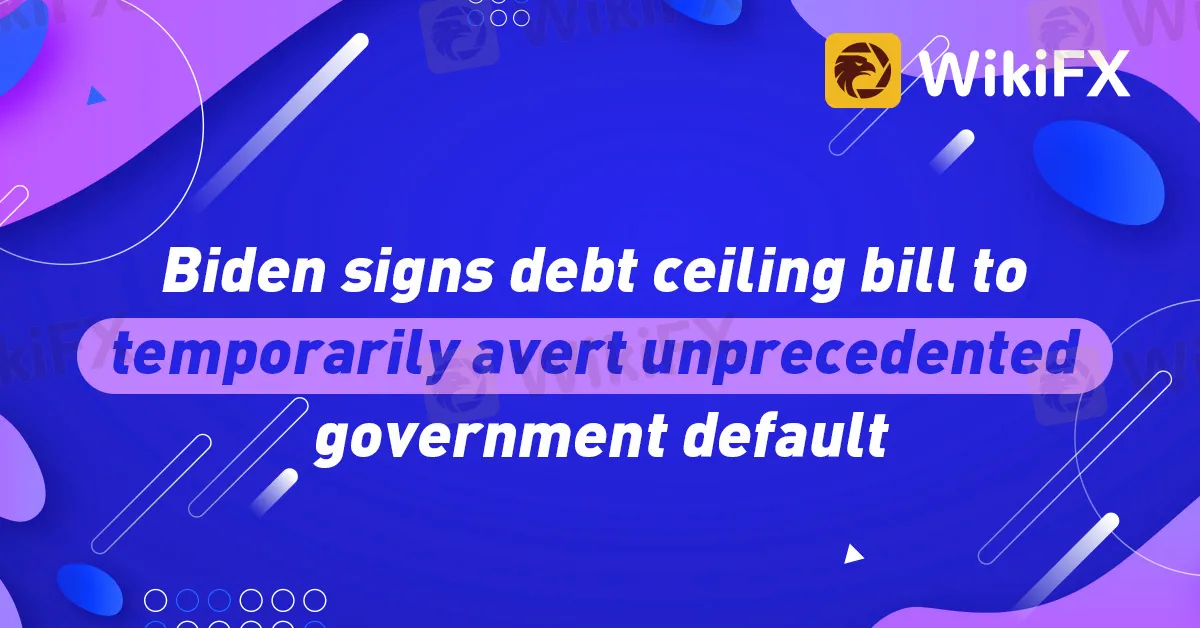简体中文
繁體中文
English
Pусский
日本語
ภาษาไทย
Tiếng Việt
Bahasa Indonesia
Español
हिन्दी
Filippiiniläinen
Français
Deutsch
Português
Türkçe
한국어
العربية
Biden signs debt ceiling bill to temporarily avert unprecedented government default
Abstract:US President Joe Biden signed a debt ceiling bill to raise American debt limits Saturday afternoon to avoid a historic default on government debt. This article delves into the significance of this action and its implications for the US economy.

US President Joe Biden took a decisive step on Saturday afternoon by signing a debt ceiling bill into law. The bill's enactment raises the American debt limits and prevents the country from facing a catastrophic default on its government debt. This move comes after months of intense negotiations between the White House and Congress to resolve the issue and avoid a potential economic crisis. The bill suspends the debt limit until January 1, 2025, providing the Treasury with the opportunity to rebuild its cash reserves to more stable levels.
Background on the Debt Ceiling
The debt ceiling refers to the maximum amount of money that the United States government is authorized to borrow in order to fund its operations and meet financial obligations. In January, the US reached its debt limit of $31.4 trillion, surpassing 120 percent of its annual GDP. Since then, the Treasury Department has been utilizing “extraordinary measures” to avoid default while the White House and Congress engaged in a prolonged debate over the terms of raising the debt ceiling.
The Need for Immediate Action
As the standoff continued, concerns grew regarding the country's financial stability. The Treasury's cash balance dropped below $23 billion on June 1, a dangerously low level considering the volatility in day-to-day federal revenues and payments. US Treasury Secretary Janet Yellen warned that failing to address the debt ceiling by June 5 could result in the country running out of money to pay its bills on time.
The Fiscal Responsibility Act of 2023
To avert a historic default, President Joe Biden signed the Fiscal Responsibility Act of 2023 into law on Saturday afternoon. This bipartisan act suspends the public debt limit until January 1, 2025, allowing the Treasury to restore its cash reserves to more normal levels. Furthermore, it raises the debt limit to match the actual debt level on January 2, 2025.
Biden's Remarks
President Biden expressed his satisfaction with the passage of the budget agreement, stating that it is a significant victory for the economy and the American people. In a speech from the Oval Office, he emphasized the compromise and consensus achieved in the deal, highlighting that although no one got everything they wanted, the American people received what they needed. He stressed that averting an economic crisis and collapse was of paramount importance and the bill successfully achieved this goal.
There is More
According to predictions from Goldman Sachs, the total federal government debt in the United States is projected to exceed $35 trillion by January 2025. This staggering figure amounts to over $100,000 per US citizen. By signing the debt ceiling bill, President Biden ensures that the government can continue to borrow money to honor its existing debts. This move is crucial for maintaining financial stability and preventing a potentially catastrophic default.
Conclusion
The signing of the debt ceiling bill by President Joe Biden brings much-needed relief and stability to the US economy. By raising the debt limit, the government can continue to meet its financial obligations and prevent a catastrophic default. The suspension of the debt ceiling until 2025 provides the Treasury with the opportunity to rebuild its cash reserves and prepare for future financial challenges. While the path to reaching this agreement was challenging, the bipartisan effort underscores the significance of compromise and consensus in addressing critical economic issues.

Disclaimer:
The views in this article only represent the author's personal views, and do not constitute investment advice on this platform. This platform does not guarantee the accuracy, completeness and timeliness of the information in the article, and will not be liable for any loss caused by the use of or reliance on the information in the article.
Read more

The Impact of Interest Rate Decisions on the Forex Market
Interest rate changes determine currency attractiveness, influencing capital flows and exchange rate trends. Understanding this mechanism helps investors navigate the forex market effectively.

How a Housewife Lost RM288,235 in a Facebook Investment Scam
A 47-year-old housewife in Malaysia recently fell victim to an online investment scam, losing a substantial sum of RM288,235 after engaging with a fraudulent scheme advertised on Facebook.

Interactive Brokers Launches Forecast Contracts in Canada for Market Predictions
Interactive Brokers introduces Forecast Contracts in Canada, enabling investors to trade on economic, political, and climate outcomes. Manage risk with ease.

Bank Negara Malaysia Flags 12 New Companies for Unauthorised Activity
Bank Negara Malaysia (BNM) has updated its Financial Consumer Alert List (FCA List) by adding 12 more entities, reinforcing its efforts to warn the public against unregulated financial schemes. Check if your broker made the list!
WikiFX Broker
Latest News
Interactive Brokers Launches Forecast Contracts in Canada for Market Predictions
Authorities Alert: MAS Impersonation Scam Hits Singapore
INFINOX Partners with Acelerador Racing for Porsche Cup Brazil 2025
The Impact of Interest Rate Decisions on the Forex Market
Billboard Warns of Crypto Scams Using Its Name – Stay Alert!
STARTRADER Spreads Kindness Through Ramadan Campaign
Rising WhatsApp Scams Highlight Need for Stronger User Protections
A Trader’s Worst Mistake: Overlooking Broker Reviews Could Cost You Everything
How a Housewife Lost RM288,235 in a Facebook Investment Scam
The Daily Habits of a Profitable Trader
Currency Calculator







